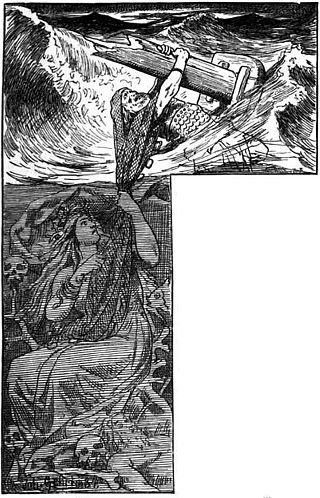
In Norse mythology, Rán is a goddess and a personification of the sea. Rán and her husband Ægir, a jötunn who also personifies the sea, have nine daughters, who personify waves. The goddess is frequently associated with a net, which she uses to capture sea-goers. According to the prose introduction to a poem in the Poetic Edda and in Völsunga saga, Rán once loaned her net to the god Loki.

Hávamál is presented as a single poem in the Codex Regius, a collection of Old Norse poems from the Viking age. A scholarly estimate of Hávamál's age dates the poem to between 900 and 1000 A.D. The poem, itself a combination of numerous shorter poems, is largely gnomic, presenting advice for living, proper conduct and wisdom. It is considered an important source of Old Norse philosophy.

The Poetic Edda is the modern name for an untitled collection of Old Norse anonymous narrative poems in alliterative verse. It is distinct from the closely related Prose Edda, although both works are seminal to the study of Old Norse poetry. Several versions of the Poetic Edda exist: especially notable is the medieval Icelandic manuscript Codex Regius, which contains 31 poems.

Brunhild, also known as Brunhilda or Brynhild, is a female character from Germanic heroic legend. She may have her origins in the Visigothic princess and queen Brunhilda of Austrasia.
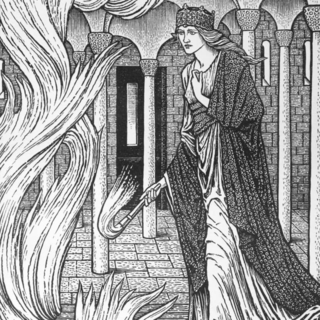
Gudrun or Kriemhild is the wife of Sigurd/Siegfried and a major figure in Germanic heroic legend and literature. She is believed to have her origins in Ildico, last wife of Attila the Hun, and two queens of the Merovingian dynasty, Brunhilda of Austrasia and Fredegund.

Gundaharius or Gundahar, better known by his legendary names Gunther or Gunnar, was a historical king of Burgundy in the early 5th century. Gundahar is attested as ruling his people shortly after they crossed the Rhine into Roman Gaul. He was involved in the campaigns of the failed Roman usurper Jovinus before the latter's defeat, after which he was settled on the left bank of the Rhine as a Roman ally. In 436, Gundahar launched an attack from his kingdom on the Roman province of Belgica Prima. He was defeated by the Roman general Flavius Aetius, who destroyed Gundahar's kingdom with the help of Hunnish mercenaries the following year, resulting in Gundahar's death.
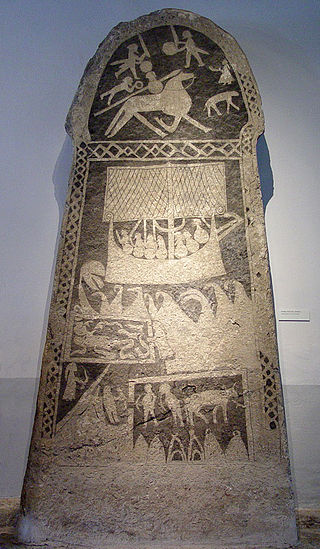
Atlakviða is one of the heroic poems of the Poetic Edda. One of the main characters is Atli who originates from Attila the Hun. It is one of the most archaic Eddic poems, possibly dating to as early as the 9th century. Owing to its stylistic similarity to Hrafnsmál it has been suggested that the poem might have been composed by Þorbjörn Hornklofi. It is preserved in the Codex Regius and the same story is related in the Völsunga saga. In the manuscript the poem is identified as Greenlandic but most scholars believe that this results from a confusion with Atlamál. The metre of the poem alternates irregularly between málaháttr and fornyrðislag. This may be an indication that two or more original poems have been merged or that the short and long lines were not felt as constituting two different metres at the time the poem was composed.

Guðrúnarhvöt is one of the heroic poems of the Poetic Edda. Gudrun had been married to the hero Sigurd and with him she had the daughter Svanhild. Svanhild had married the Gothic king Ermanaric (Jörmunrekkr), but betrayed him with the king's son, Randver. Furious Ermanaric hanged his own son and had Svanhild trampled to death by horses.

Svanhildr is the beautiful daughter of Sigurd and Gudrun in Germanic heroic legend, whose grisly death at the hands of her jealous royal husband Ermanaric was told in many northern European stories, including the Old Norse Poetic Edda, Prose Edda, and Völsunga Saga; the skaldic poem Ragnarsdrápa; the Danish Latin Gesta Danorum; and the German Latin Annals of Quedlinburg.
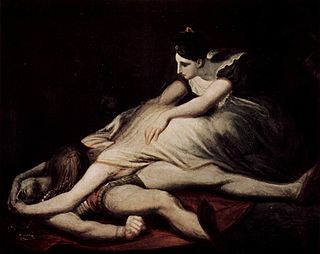
Guðrúnarkviða I or the First Lay of Guðrún is simply called Guðrúnarkviða in Codex Regius, where it is found together with the other heroic poems of the Poetic Edda. Henry Adams Bellows considered it to be one of the finest of the eddic poems with an "extraordinary emotional intensity and dramatic force". It is only in this poem that Gjúki's sister Gjaflaug and daughter Gollrönd are mentioned, and the only source where Herborg, the queen of the Huns, appears. The Guðrún lays show that the hard-boiled heroic poetry of the Poetic Edda also had a place for the hardships of women.
Guðrúnarkviða III, The Third Lay of Gudrun, is a short Old Norse poem that is part of the Poetic Edda. It has not left any traces in Völsunga saga and was probably not known by its compilers.
Guðrúnarkviða I, II and III are three different heroic poems in the Poetic Edda with the same protagonist, Gudrun.
Atli is an Old Norse masculine personal name, and may refer to:
In Norse mythology, Glasir is a tree or grove, described as "the most beautiful among gods and men", bearing golden red leaves located in the realm of Asgard, outside the doors of Valhalla. Glasir is attested in the 13th century Prose Edda book Skáldskaparmál where it receives three mentions, one of which mentions its location and all of which focus on the golden leaves of the tree. Glasislundr appears in the Poetic Edda poem Helgakviða Hjörvarðssonar.
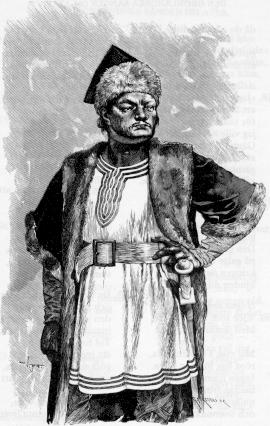
The Dráp Niflunga is a short prose section in the Poetic Edda between Helreið Brynhildar and Guðrúnarkviða II. Henry Adams Bellows notes in his commentary that the purpose of the section is to serve as a narrative link between the poems.

Atlamál in grǿnlenzku is one of the heroic poems of the Poetic Edda. It relates the same basic story as Atlakviða at greater length and in a different style. The poem is believed to have been composed in Greenland, most likely in the 12th century. It has 103 stanzas and is the only Eddic poem written entirely in the metre málaháttr.

The Legend of Sigurd and Gudrún is a book containing two narrative poems and related texts composed by English writer J. R. R. Tolkien. It was published by Houghton Mifflin Harcourt and HarperCollins on 5 May 2009.
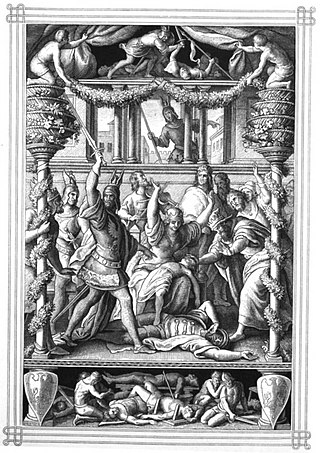
Ortlieb is the son of Kriemhild (Gudrun) and Etzel (Atli) and a minor figure in Germanic heroic legend and literature.













